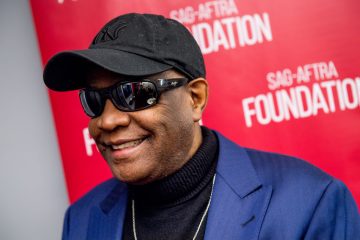Johnny Hallyday Net Worth | Celebrity Net Worth

Johnny Hallyday, often dubbed the “French Elvis,” left an indelible mark on the music and film industry with a career spanning over five decades. Famous for his electric performances and distinct voice, Hallyday’s legacy is celebrated not just for his cultural influence but also for the significant wealth he amassed. This article delves into the financial aspects of Hallyday’s illustrious career, exploring his net worth and the ensuing estate disputes following his passing. We also look back at his early life and his impressive journey through music and film, which captivated audiences worldwide. Finally, we reflect on the personal milestones and challenges that marked his life until his death. Join us as we explore the multifaceted story behind one of France’s most legendary entertainment icons.
What was Johnny Hallyday’s Net Worth?
Johnny Hallyday enjoyed a prolific career that spanned over five decades, during which he accumulated significant wealth. By the time of his passing in 2017, Hallyday’s net worth was estimated to be around $200 million. This impressive figure was attributed to his success as a musician, film actor, and influential cultural icon in France and beyond.
His wealth was primarily derived from his music career, which saw him record over 1,000 songs and sell more than 110 million records worldwide. Concert tours also contributed heavily to his income, with sold-out shows in major arenas across Europe.
To put this into perspective:
| Source of Income | Estimated Earnings |
|---|---|
| Album Sales and Royalties | $70 million |
| Concert Tours | $90 million |
| Film Appearances | $20 million |
| Endorsements and Other Ventures | $20 million |
Despite his financial success, Hallyday’s estate became the subject of a legal dispute, highlighting complexities often faced by celebrities in managing their wealth. This dispute shed light on the challenges faced by his family and heirs in the aftermath of his death.
Estate Dispute
The passing of Johnny Hallyday in 2017 led to a high-profile estate dispute that captured the attention of fans and media alike. The legal battle primarily involved Hallyday’s two eldest children, Laura Smet and David Hallyday, and his widow, Laeticia Hallyday. Central to the conflict was the distribution of Hallyday’s significant assets, which stood to include his properties, music royalties, and other prized possessions.
Hallyday had reportedly drafted a will under Californian law, which favored Laeticia, effectively disinheriting Laura and David. This action sparked a controversial debate, as French inheritance laws typically prevent children from being completely excluded from a parent’s estate. The subsequent legal proceedings took place across multiple courts, with the central argument focusing on whether French or Californian law should prevail.
After years of litigation, the parties involved reached a settlement in 2020. The agreement sought to balance the interests of all involved while aligning with the wishes Hallyday had expressed. This resolution, although reached amicably, still left a mark on the legacy of Johnny Hallyday, illustrating the complex nature of international inheritance laws and the personal strains they can reveal within families.
Early Life
Johnny Hallyday, born Jean-Philippe Léo Smet, entered the world on June 15, 1943, in Paris, France. Raised in a family with Belgian roots, his upbringing was far from a conventional one. His father, Léon Smet, abandoned the family when Johnny was still an infant. Consequently, his mother, Huguette Clerc, found herself unable to care for him due to financial constraints and handed him over to her sister, Hélène Mar.
Hélène was married to an American dancer named Lee Halliday, whose name young Jean-Philippe would eventually adopt as his own stage name. It was through Lee Halliday and his connections that Johnny was exposed to the entertainment industry. He often accompanied Hélène and Lee to their performances, sparking an interest in him towards performing arts.
During his childhood, Johnny Hallyday was captivated by American rock ‘n’ roll music. Influenced by Elvis Presley, Buddy Holly, and Eddie Cochran, he knew early on that he wanted to be a musician. Lee Halliday played a significant role in nurturing his ambitions, teaching him to play the guitar and encouraging his musical pursuits. By the age of 12, Johnny was already performing and honing his craft, setting the stage for a career that would not only skyrocket him to fame in France but also earn him the title of the French Elvis.
Music Career
Johnny Hallyday, often referred to as the French Elvis, carved out a monumental place in the music industry with a career spanning over five decades. Starting in the early 1960s, Hallyday emerged as a pioneer of the French rock and roll scene. His powerful voice and energetic performances captivated audiences, creating a devoted fan base that followed him throughout his life.
Known for his versatility, Johnny Hallyday seamlessly navigated multiple genres, including rock, pop, and blues. His breakthrough came with the release of Souvenirs, Souvenirs in 1960, which established him as a household name in France. Over the years, he accumulated a vast discography of over 1,100 songs, many of which resonated deeply with his listeners.
Hallyday’s collaboration with prominent songwriters and producers like Michel Berger and Jean-Jacques Goldman resulted in some of his most iconic albums. Notably, Gang (1986) and L’Attente (2012) showcase his evolving musical style and continue to be celebrated for their artistry. His concerts were legendary, marked by stunning visual effects and Hallyday’s electrifying stage presence.
The influence of Johnny Hallyday extended beyond his home country, with tours that took him across Europe and even to the United States. While his success internationally might not have mirrored his dominance in France, he remained a cultural icon, bridging the gap between French and American music styles.
| Year | Notable Album |
|---|---|
| 1969 | Rivière… Ouvre Ton Lit |
| 1976 | Derrière L’Amour |
| 1989 | Cadillac |
| 1999 | Sang pour Sang |
Despite challenges in his personal life and changing musical trends, Johnny Hallyday consistently reinvented himself, ensuring his music remained relevant well into the 21st century. His last album, Mon Pays C’est L’Amour, released posthumously, topped the charts, reaffirming his enduring legacy in the music world.
Film Career
Johnny Hallyday was as much a luminary in the film industry as he was in music. He embarked on his cinematic journey in the 1960s, appearing in several French films that showcased his charismatic persona. Hallyday’s film debut was in 1955, but it wasn’t until 1962, with “Where the Boys Are,” that he truly began to catch Hollywood’s eye. His rugged charm and innate acting skills led to roles in notable French films such as The Specialists (1969) and Terminus (1987).
One of his acclaimed performances was in the 2002 drama L’Homme du Train, a film that received international recognition and critical acclaim. His role as a mysterious, world-weary criminal juxtaposed against a retired schoolteacher won him praise for his ability to convey depth and nuance.
Even though his music career often overshadowed his film work, Johnny Hallyday continued to work with prominent directors, such as Jean-Luc Godard and Johnnie To. These collaborations solidified his status as a multifaceted star who transcended the typical crossover from music to film. His impact on cinema also included contributions to soundtracks, merging his musical and film endeavors seamlessly.
Hallyday’s film career, much like his music, was marked by versatility and a constant desire to challenge himself artistically. This passion not only expanded his reach as an artist but also contributed to a robust filmography that complemented his legendary status in the entertainment industry.
Personal Life and Death
Johnny Hallyday, born Jean-Philippe Smet, was a legendary French singer and actor known for his rock and roll style. His personal life was as vibrant and publicized as his career. Hallyday was married five times, with his relationships continuously making headlines. His marriages to Sylvie Vartan and Adeline Blondieau were particularly notable, drawing significant media attention.
Hallyday had two children: Laura Smet, an actress and daughter of his partner Nathalie Baye, and David Hallyday, a musician from his marriage to Sylvie Vartan. In addition to his biological children, Hallyday and his wife Laeticia adopted two daughters, Jade and Joy, from Vietnam.
Johnny Hallyday struggled with various health issues, including colon cancer in 2009, which he successfully overcame. However, in March 2017, he publicly announced that he was being treated for lung cancer, demonstrating his characteristic openness with fans about his personal struggles.
On December 5, 2017, Hallyday passed away at 74, at his residence in Marnes-la-Coquette, near Paris. His death marked the end of an era for French rock and roll, leading to a national outpouring of grief. The French government organized a state funeral at the Church of the Madeleine in Paris, a testament to his immense cultural impact. An estimated one million people packed the streets to bid farewell, accompanied by a live television audience of millions more.
The distribution of Johnny Hallyday‘s estate became a highly publicized legal battle after his death, with his widow Laeticia and his older children from previous relationships embroiled in a dispute. This controversy attracted significant attention, emphasizing the complicated dynamics and enduring legacy he left behind.















